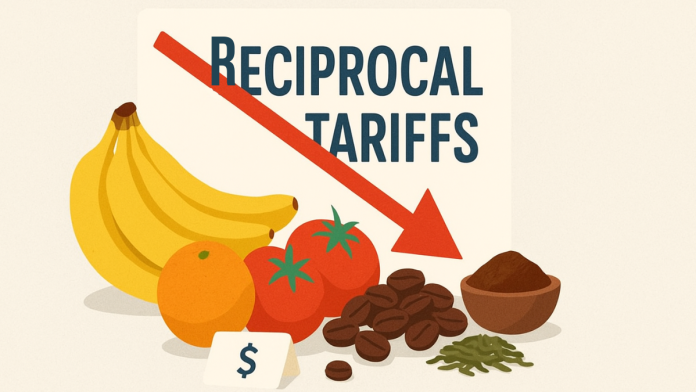President Donald Trump has taken a significant step to reduce grocery prices by removing tariffs on a range of imported agricultural products. The executive order, signed on Friday afternoon, targets goods that are generally not grown or produced in the United States, with the aim of easing the cost of living for American shoppers.
Tariffs Removed on Everyday Agricultural Products
The executive order removes reciprocal tariffs that had been imposed earlier this year using emergency powers. These tariffs applied extra charges to imports from countries that also taxed U.S. goods. With the new exemptions, several widely consumed items will no longer face these additional costs.
Products covered under the new policy include common and tropical fruits such as bananas, oranges, and tomatoes, as well as coffee, cocoa, tea, beef, spices, and some fertilizers. According to U.S. Trade Representative Jamieson Greer, the move comes after the administration achieved “critical mass” in reshaping global trade policies, making it the right time to release certain items from tariffs.
Officials highlighted that the exemption focuses on goods that are rarely produced domestically, allowing consumers to benefit from lower prices without harming U.S. producers. The removal of tariffs is intended to make these essential goods more affordable while maintaining the administration’s broader trade strategy.
Shift from Previous Trade Policies
The new order represents a major shift from Trump’s earlier trade approach, which relied heavily on tariffs to protect U.S. industries. While the tariffs were meant to encourage fair trade and leverage U.S. bargaining power internationally, they also contributed to higher prices for American consumers, particularly for everyday items like fruits, coffee, and beef.
This rollback takes effect immediately and follows earlier deals, including agreements with Switzerland to ease tariffs imposed on imports from the European Alpine nation earlier this year. By targeting goods not readily available from domestic sources, the administration seeks to provide direct relief to shoppers while minimizing disruption to local industries.
Reactions from Businesses and Lawmakers
The announcement drew mixed reactions. Business groups welcomed the change, seeing it as a way to ease costs for American households. Neil Bradley, chief policy officer of the U.S. Chamber of Commerce, said the move is a step in the right direction and encouraged the administration to provide additional tariff relief for other products where tariffs could threaten jobs or raise prices.
Coffee inflation exposes cracks in America’s food economy — and the limits of tariff politics
Critics, however, argue that the move is not enough to counter the broader impact of previous tariffs. Don Beyer, a Democratic lawmaker from Virginia, said that while the reduction may help lower prices on some items, it does not address the larger problems caused by the tariff policies, including inflation, business uncertainty, and economic damage.
The timing of the announcement is notable. Recent polling from RealClearPolitics shows that Trump’s approval ratings on the economy were 41 percent, with 56 percent disapproving. The tariff rollback comes amid concerns about rising prices and public dissatisfaction with the economic situation, making the removal of tariffs a highly visible move to directly address consumer costs.
The exemptions now apply immediately, meaning that imported bananas, coffee, cocoa, tea, tomatoes, oranges, and beef will no longer carry extra charges. The policy also includes some spices and fertilizers, helping lower the cost of both food and agricultural inputs. While the action provides immediate relief for consumers, it is also a signal of a softening in Trump’s previously aggressive trade policies, showing a willingness to adjust tariffs in response to public concerns.


